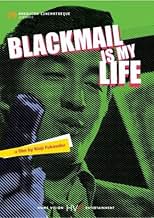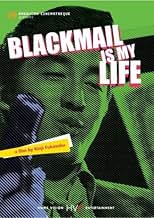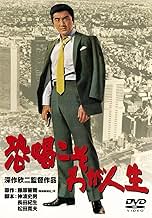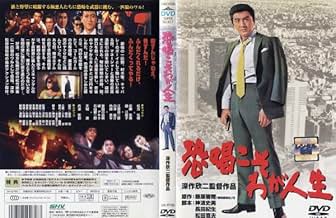Adicionar um enredo no seu idiomaA pungent, extremely entertaining tale of hedonistic, amoral blackmailer Matsukata.A pungent, extremely entertaining tale of hedonistic, amoral blackmailer Matsukata.A pungent, extremely entertaining tale of hedonistic, amoral blackmailer Matsukata.
- Direção
- Roteiristas
- Artistas
Avaliações em destaque
Very stylish and innovative, this also moves at a furious pace. Excitingly and beautifully shot, this is a tale of four youngsters setting out on a career as blackmailers as they seem to have been passed by in the post-war Japanese boom. It can be a bit confusing with so many characters and the usual, bluff, double bluff and downright betrayal. The story is told both backwards and forwards and often the only way to tell of a flashback is that it begins in b/w, slowly turning to colour for most of the sequence, except for the times that it doesn't! There are so many stand out sequences but a colour sequence of consensual lovemaking intercut with one that is certainly not consensual in b/w is particularly effective. Outstanding camera-work and direction ensure that this looks and feels great all the time and if the ending is a little melodramatic, it is still enthusiastically shot with hand held and whirling cameras.
I really wanted to like this movie and for the first half hour it delivers. Interesting shots, flashbacks, cool stuff and innovative for the 1960s. Good backstory of the hero is shown, and interesting blackmail plot for the first 40 minutes. But then the writers and director lost focus, the plot got boring, and my urge was to turn the movie off. Now that's not a good instinct for a movie you want to like. I give it a 6 simply for the great beginning and interesting film style, but it could have been much better. Without this, the movie is below average, a 4 or 5. I do not recommend except for those interested in these kinds of movies, students, film buffs, etc. For most, this will be a big disappointment.
Blackmail Is My Life (1968)
Well, the bad guys (four men and one woman, all young and good looking) have a lot of fun, and carry a lot of poise. As rank amateurs they are lucky and, between racing around in their car, show a lot of cool style. It's 1968 in Japan, and it feels like maybe 1964 in the U.S., with people still wearing suits and looking good doing it.
Eventually, they get in over their heads, but we don't really worry at first. They often say vague things like, "We'll go ahead with out plan," but they never say what they are planning. And then the plan happens, and it's fast and jazzy, in a kind of extended television way. The plot is kind of interesting, digging into the underworld of Japan in this sideways fashion. And visually it's fun, very nice wide screen compositions in a wide range of gritty Japanese locations. There is even a dramatic, spare electric guitar score, perfect for the period.
The more serious and deadly this movie gets, the more it loses it's lighthearted flaws. There is clearly (to me) an influence from Bonnie and Clyde (the previous year) with romanticizing bad guys and extended violence. There is some real poignancy built in, as well. There are lots of night scenes and dramatic lighting, and this has a late film noir kind of quality, somehow, dark and brooding between action scenes. If you don't mind some Japanese camp aspects, this might really make your night. And just a heads up: the second half is easier to like in a conventional way, even if the first half is more original and excessive.
Well, the bad guys (four men and one woman, all young and good looking) have a lot of fun, and carry a lot of poise. As rank amateurs they are lucky and, between racing around in their car, show a lot of cool style. It's 1968 in Japan, and it feels like maybe 1964 in the U.S., with people still wearing suits and looking good doing it.
Eventually, they get in over their heads, but we don't really worry at first. They often say vague things like, "We'll go ahead with out plan," but they never say what they are planning. And then the plan happens, and it's fast and jazzy, in a kind of extended television way. The plot is kind of interesting, digging into the underworld of Japan in this sideways fashion. And visually it's fun, very nice wide screen compositions in a wide range of gritty Japanese locations. There is even a dramatic, spare electric guitar score, perfect for the period.
The more serious and deadly this movie gets, the more it loses it's lighthearted flaws. There is clearly (to me) an influence from Bonnie and Clyde (the previous year) with romanticizing bad guys and extended violence. There is some real poignancy built in, as well. There are lots of night scenes and dramatic lighting, and this has a late film noir kind of quality, somehow, dark and brooding between action scenes. If you don't mind some Japanese camp aspects, this might really make your night. And just a heads up: the second half is easier to like in a conventional way, even if the first half is more original and excessive.
This film essentially begins with a young man by the name of "Shun Muraki" (Hiroki Matsukata) working for low wages as a waiter at a nightclub. His life then changes when he is severely beaten because he happened to overhear his boss telling another employee how he cheats his customers by substituting cheap alcohol for more expensive brands. Having just recovered from his injuries, he then has a meeting with three trusted friends and together they decide to get even by blackmailing everyone who had a part in his former employer's scheme. From that point on, they all decide to continue their blackmail operation by going after suitable targets who cannot afford to have their indiscretions disclosed. What they fail to take into account, however, is that there are some targets who carry a greater amount of risk than they may be able to handle. Now, rather than reveal any more, I will just say that this turned out to be a pretty good film which benefited from generous amounts of drama, suspense and humor. Likewise, having two attractive actresses like Yoko Mihara (as Shun's girlfriend "Natsuko Mizuhara") and Tomomi Sato ("Otoki") certainly didn't hurt in any way either. On the flip side, however, I didn't especially care for the ending which, I believe, could have been done much better. Be that as it may, I enjoyed this film for the most part and have rated it accordingly. Slightly above average.
The story involves four people whose work is blackmail. They're successful in their "business," but their eyes eventually get too big for their stomachs when they think they've found a way to rip off the yakuza. The job proves harder than the easy money it initially seemed. While it is generally well done, its techniques reminded me a little too much of the annoying modern style with a lot of unnecessary freeze frames, chronological jumps, and shifts from black and white to color. I also felt that the characters ought to have been more well developed; the story is good, but the style overwhelms possible substance. My favorite part of the film is the fact that the characters whistle the theme tune to Suzuki Seijun's Tokyo Drifter, which means that Suzuki had to have had some popularity if his work was quoted like this. 7/10.
Você sabia?
- CuriosidadesTitle music, played several times during the film, is ripped off (different but substantially an imitation) from the 1966 Yardbirds' song "Over Under Sideways Down".
- ConexõesReferences Tóquio Violenta (1966)
Principais escolhas
Faça login para avaliar e ver a lista de recomendações personalizadas
Detalhes
- País de origem
- Idioma
- Também conhecido como
- Blackmail Is My Life
- Empresa de produção
- Consulte mais créditos da empresa na IMDbPro
- Tempo de duração1 hora 30 minutos
- Mixagem de som
- Proporção
- 2.35 : 1
Contribua para esta página
Sugerir uma alteração ou adicionar conteúdo ausente

Principal brecha
By what name was Kyôkatsu koso waga jinsei (1968) officially released in Canada in English?
Responda





















